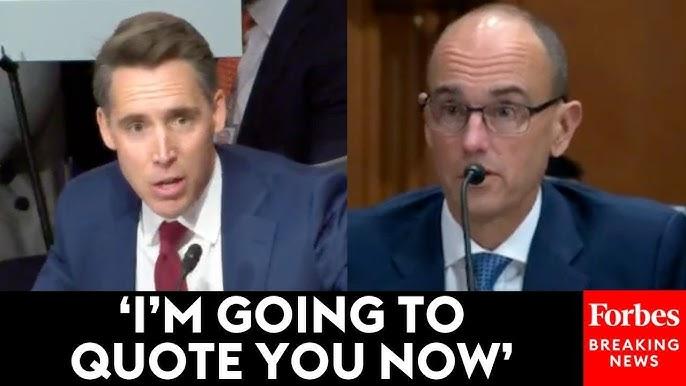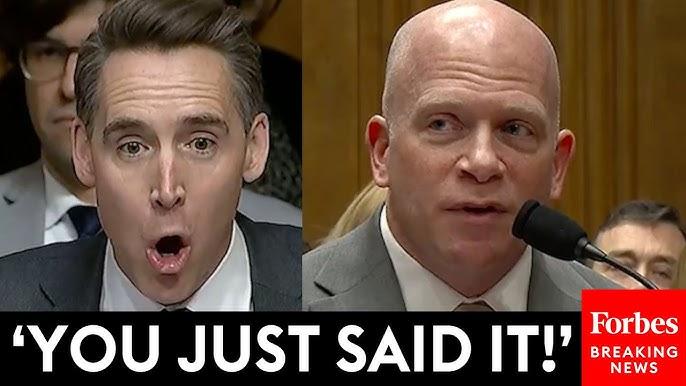Senator Josh Hawley’s recent proposal to allow consumers to sue Big Tech companies for allegedly aiding cartels in the fentanyl epidemic has sparked a global stir. This bold suggestion has sent shockwaves through both the political and technological spheres, as it draws attention to the intersection of corporate responsibility, drug trafficking, and the public health crisis caused by fentanyl. The proposal raises crucial questions about accountability, the role of tech giants in societal issues, and the effectiveness of legal actions in tackling the fentanyl epidemic.

The United States is currently grappling with an unprecedented fentanyl crisis. This powerful synthetic opioid has claimed tens of thousands of lives each year, devastating communities across the country. While the epidemic is complex, involving numerous factors such as over-prescription of painkillers, insufficient addiction treatment resources, and inadequate law enforcement, fentanyl’s widespread availability on the black market is a major contributor to the crisis. In recent years, much of the illegal fentanyl in the U.S. has been imported from Mexico, often through highly organized and violent cartels.
What Hawley proposes is a radical shift in how technology companies could be held accountable for their role in the epidemic. He argues that tech giants like Facebook, Google, and Amazon have inadvertently facilitated the trafficking of fentanyl by allowing cartels to operate on their platforms, through the sale of illicit drugs or the promotion of illegal content. Hawley’s position is rooted in the belief that Big Tech has a moral and legal responsibility to prevent such activities from occurring, and that they should be held accountable for their failure to do so. By proposing that consumers be allowed to sue these companies, he is not just calling for increased regulation but for a complete restructuring of how we view the role of digital platforms in society.

Critics of Hawley’s proposal, however, argue that it is a dangerous overreach. Some claim that such a measure would set a troubling precedent for holding private companies responsible for the actions of individuals who use their platforms for illegal purposes. While tech companies have faced increasing pressure to combat online criminal activities, the idea of allowing individuals to sue these companies directly is fraught with potential legal and logistical challenges. For one, proving that a tech company knowingly facilitated cartel activity could be incredibly difficult. Additionally, critics warn that this could lead to a wave of frivolous lawsuits against tech companies, ultimately stifling innovation and free speech on the internet.
On the other hand, Hawley’s supporters argue that this proposal is necessary to ensure that Big Tech is held accountable for its role in enabling the spread of illegal substances. They contend that tech companies have long profited from their platforms without taking sufficient action to prevent their use for illicit activities. For example, Hawley has cited the use of social media platforms to recruit new users for drug trafficking rings and the ability of sellers to advertise fentanyl and other dangerous drugs through encrypted messaging services. Supporters of the proposal believe that by allowing lawsuits, the public will force tech companies to take more aggressive steps in policing their platforms and addressing illegal activity.
While the debate surrounding Hawley’s proposal has been intense, it highlights a much larger issue at play: the balance between free speech and public safety. Tech companies have long argued that they cannot police every user interaction on their platforms, citing the sheer volume of content generated every day. They also argue that they are not responsible for the actions of individual users, as doing so would require an unreasonable level of oversight. However, the fentanyl crisis has brought new urgency to these concerns. With the U.S. government struggling to keep up with the rapidly evolving drug trade, many believe that tech companies must do more to prevent their platforms from being used for illegal activities.
In response to Hawley’s proposal, some lawmakers have suggested alternative approaches. They advocate for stricter regulations on tech companies, such as requiring them to adopt stronger content moderation policies or imposing fines for non-compliance. Others have proposed the creation of a specialized task force that would focus on identifying and dismantling online drug trafficking networks. While these suggestions have merit, they also raise questions about the balance between regulation and innovation, and whether such measures would be effective in curbing the flow of fentanyl on the internet.
Ultimately, Hawley’s proposal serves as a stark reminder of the growing influence of Big Tech on society and the need for new approaches to deal with the unintended consequences of technological advancements. Whether his plan will gain traction in Washington remains to be seen, but it has undoubtedly sparked an important conversation about accountability, corporate responsibility, and the role of technology in shaping our world. The fentanyl epidemic is a public health crisis that demands immediate attention, and while Hawley’s proposal may be controversial, it underscores the urgent need for action in tackling this devastating issue.






